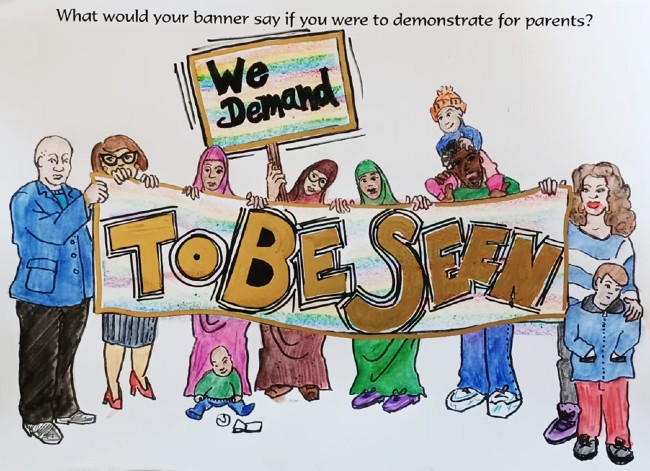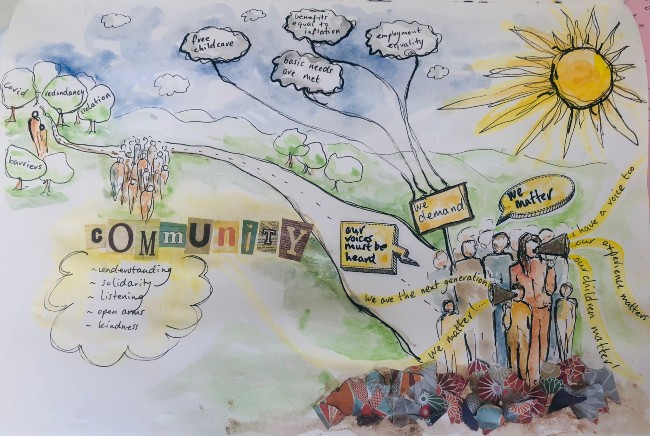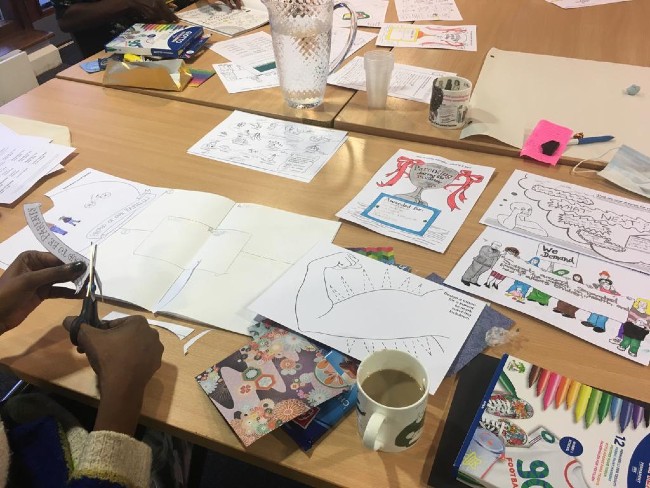‘We shouldn’t have to shout to be heard’: Valuing Parents as Experts

Image credit: Becky Whitmore
Research at the University of Bristol and elsewhere has demonstrated the immense impact that the Covid-19 pandemic has had upon the mental health, education and wellbeing of young people in Britain and beyond. While there has been some recognition of the challenges faced by parents, this has been less well documented.
Throughout the Covid-19 lockdowns of 2020 and 2021, conversations with parents based in Bristol who were working on the SPAN History project, made it very clear that the challenges of the pandemic were being felt particularly acutely by families living with a disability, those from minority communities, those on low incomes, as well as by single parents and new mothers. To learn more about what it was like to be a parent during the pandemic, researchers at the University of Bristol and the Wellspring Settlement embarked on a collaborative project that used community art groups as a platform for learning more about the experiences and hopes of parents. The project was designed to offer a platform in the public realm for parents’ voices.
Run by our Art Research Co-ordinator, Jude Hutchen, the Creative Connections project ran four five-week art groups between Autumn 2021 and Spring 2022. Art group participants were recruited from across Bristol and membership targeted single and/or first-time mothers, those on low-incomes, women with disabled family members, LGBTQ+ parents, and mothers from other minority communities. Each person was sent an art pack containing art supplies and each week they were given a series of artistic prompts to reflect on aspects of their pandemic experience. Through the prompts, art group participants described their families, discussed the aspects of the pandemic that were particularly challenging, reflected on what they are proud of and have achieved during the last few years, and articulated the changes they would most like to see in society to improve their lives and those of their children.
The artwork and material generated by the art groups was subsequently considered by a team of Art Researchers, themselves members of the local community, who have analysed the material. In addition to this Policy Briefing, the art groups’ discussions and artwork have been used to inspire a billboard campaign, designed by local artist Lucy Turner and Rising Arts Agency.
Art group participants were recruited from across Bristol and membership targeted single and/or first-time mothers, those on low-incomes, women with disabled family members, LGBTQ+ parents, and mothers from other minority communities.
Key Findings
The experiences represented in the art groups were all unique with each family having experienced a different combination of challenges. Reflecting on their experiences of the pandemic and looking forward to the post-pandemic period, however, a number of key themes emerged from women’s testimonies and artwork.
The overarching theme to emerge from the groups was a feeling that parents’ own expertise regarding their children’s wellbeing was not recognized or taken seriously. Women expressed frustration at the barriers that prevent them from accessing the resources and support they need to ensure the security, happiness and wellbeing of their children. In the words of one participant: ‘Being her mum is not burdensome but not having an outlet for me to ask for support has been horrible.’ Participants wanted to push back on a system in which they feel ‘decisions are made for us not by us’.
Childcare
• Both single parents and those living with partners described a lack of childcare support as a persistent challenge. In the art sessions, parents described harrowing experiences of having to manage childcare alone during the pandemic. These experiences were particularly challenging for single mothers, new mothers, those with young children, and families living with disabilities. While the end of lockdown has eased some of these pressures, many remain as parents have attempted to return to work.
• In addition to affecting the mental health of parents, the demands of childcare have material consequences for families. Parents described themselves as feeling ‘trapped’ until their children reach school age. Beyond the well-documented issues that limited childcare facilities create for women looking to return to paid employment, art group participants shared how a lack of childcare support makes it difficult for women to attend healthcare appointments and to find housing. We saw this first hand as a number of potential participants who had expressed interest in joining the art groups were unable to do so as we could not provide creche facilities.
"If you think about putting your child into full time care you are pretty much paying someone your whole wage… It doesn’t give mothers the opportunities to get back into the community, go back to work or get back to a sort of normality, to their own lives."
Schools
• One widely-experienced challenge shared by parents related to the quality of communication they had with their children’s schools. While parents acknowledged the burden placed on teachers by the sudden shift to home schooling, they articulated feelings of having been left ‘completely in the dark’ during the pandemic. Mums recalled the stress and anxiety they experienced at having been expected to be able to deliver home-schooling with no training or coaching.
• In addition to not feeling well-informed about home schooling, parents also shared their frustration at not having channels to interact with schools and/or make interventions on behalf of their children. Beyond the pandemic, parents felt that the quality of communication with schools and teachers needed to improve. As one woman noted: ‘We have to act cautiously to discuss issues with teachers so we are listened to’. This feeling was particularly acute among ethnic minority women who noted the existence of ‘stereotypes about black angry mums’ and the barriers this posed in terms of parent-teacher interaction.
"There were high expectations put on parents with little support on how to deliver the lessons. It would have been better to talk to parents and coach them before starting to deliver the lessons."
Special Educational Needs and Disabilities (SEND)
• Several of the art group participants and Art Researchers have children with disabilities and/or (suspected) special educational needs. Although home-schooling allowed some children to receive bespoke education in contexts better suited to their needs, limited access to professional support and resources was felt acutely by parents.
• Reflecting on the upheavals of the Covid-19 lockdowns as well as the situation pre- and post-pandemic, parents described how there is often a long wait from the point at which parents or teachers flag potential educational needs and children receiving official diagnoses. In order to access support services and resources, however, children need to have a diagnosis. This means that families can be left in ‘limbo’ for months (or years), unable to access support. In one case, a mother described being told by her school’s Special Needs Co-ordinator that they had ‘to wait for [her son] to fail’ in order to get additional support.
Community-building
Looking back on the art groups, participants identified three ways that the project had benefitted their lives.
- Connection. Participants enjoyed the opportunities to meet and talk to other parents. Many enjoyed the socialising aspect and spoke of having developed a real ‘connection’ to the others in their group. Participants valued the reciprocity of the groups which provided an opportunity to hear about the experiences of others and share their own stories. As one participant reflected: ‘I felt like it was a safe space to share my experiences and felt heard. It was really valuable hearing everyone else’s too’.
- Creativity. Many participants valued having the ‘freedom to be creative’. Participants liked the art prompts format which they felt gave the sessions focus while allowing individuals to be creative and articulate their own experience. In the words of one participant: ‘[I] really loved how incredibly different our art was and how we each interpreted the task differently but all had meaningful and valid points that reflected each other’s experience of Covid lockdown.’
- Advice. Art sessions were also a source of practical support and advice. Many participants suggested that they had difficulty accessing professional services (such as SEND referrals, childcare, and mental health support) and so valued the opportunity to hear about resources and strategies for getting support from one another. A number of participants were signposted to family activities and others were referred to mental health services.
"It’s reassuring to hear people are on the same wavelength about these things because these aren’t conversations you can have in the park over a coffee. It’s nice not to feel quite so alone thinking about the bigger picture."

Policy recommendations
- Schools, healthcare providers and social support services must create a culture in which parents’ expertise on their children’s wellbeing is recognised. Parents should be considered equal partners in decisions that are made about their children.
- Childcare. Bristol City Council should establish a commission to explore the availability of childcare in the city, and the strategies currently used by parents to cover childcare. The committee should consider both formal institutions of childcare provision (including after-school care and provision for children with SEND), as well as the informal arrangements with family and friends that parents rely upon.
- Schools. Individual schools should survey parents on their experiences of communication, transparency and access to teachers and leaders. Responses should be analysed by categories such as age, race, language, disability, occupation of parents to identify any issues of inclusion and representation and schools should report to parents and governing bodies on any action points that have been identified.
- Support for children with SEND. Families need better support for children with special educational needs and disabilities (SEND) in advance of formal diagnoses. Schools and healthcare providers should signpost parents and carers to support resources when special needs are raised as a potential issue.
- Community-building. Local councils and community organisations should work together create and fund support groups which give parents opportunities to meet and share their experiences with other parents.

Further information
The Creative Connections project ran from Autumn 2021 to Summer 2022. A public art campaign drawing on the artwork and findings of the project was supported by Rising Arts agency and ran on billboards and posters across Bristol in October 2022.
The SPAN Project was a participatory research project that ran from 2019-2021 in which members of the public researched the history of the Single Parent Action Network between 1990 and 2016.
Wellspring Settlementis a Bristol-based Community Anchor Organisation that enables residents of Barton Hill and the wider area to participate in activities building health, equality and resilience within the community.
This work was supported by the Arts and Humanities Research Council [grant numbers AH/S000542/1 and AH/V015850/1]’.
Authors
Dr Hannah Charnock, Prof. Josie McLellan (University of Bristol), Jude Hutchen (Wellspring Settlement), Sharon Evans, Jendaye Selassie, Muna Hussein, Becky Whitmore, Roofi Hamid (Community Researchers from Wellspring Settlement)
Policy Report 75: Oct 2022
‘We shouldn’t have to shout to be heard’: Valuing Parents as Experts (PDF, 1,222kB)
Contact the researchers
Jude Hutchen

.jpg)
